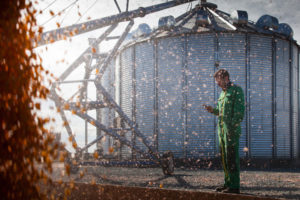
A Competitive Industry
The preponderance of French seeds on the international market proves their competitiveness. Committed to excellence and quality, the French seed maize industry has equipped itself with a series of tools and indicators that are vital to the preservation of its long-standing market leadership.
Innovating to Remain a Leader
France is Europe’s first producer, and the first world exporter of, maize seed. Known for its quality, 60 percent of the country’s seed production goes to export. To preserve that level of excellence, the French industry of maize seed endeavours to innovate and capitalise on its various assets on a daily basis.
The industry’s striving for competitiveness goes along those same lines of performance and innovation. Since it views quality as its primary objective, the industry seeks to open up new paths of reflection on technical, agronomic, or organisational aspects. Thus “diagnostics” are run to identify various axes of improvement – whether it is about harvest sequence, irrigation and fertilisation strategies, or promoting the unmatched competitiveness of French seeds.
Knowing Market Demand

Through its inter-profession, the French maize seed industry actively monitors trends on the main export markets. For several years, the inter-profession has fine-tuned its knowledge of the various maize cropping systems in Europe, which is vital in seizing and understanding changes on the various markets. Thanks to that expertise, the industry is able to permanently adjust to market demand and to the various requirements of its customers.
The inter-profession also produces several economic indicators related to seed production, which are meant to measure the competitiveness of the industry’s activity, as well as warrant a fair sharing of the value added among its actors.
Promotion and training activities carried out in high-potential countries constitute additional levers for economic performance. These “post-sale services” – which are unique in the world – are complementary to the high genetic potential of French-produced seed. This adds significant value before both the client and the user looking for optimum production.
Technical Activities Regarding Seed: Investing in Production Research
The industry’s programme of technical activities aims at improving the competitiveness of the French seed production, both in terms of quality and quantity. Given their complex character, these activities are carried out with the aid of seed production experts working for ARVALIS-Institut du Végétal. The industry allocates an important part of its annual budget to an extensive research programme focused on strengthening the producers’ know-how. It is an applied research programme that responds to preoccupations expressed both by producers and seed companies.
The technical activities complement the ones carried out by companies, creating a positive synergy that fosters an ongoing improvement of the quality and productivity of French seeds. Based on that technical groundwork, the average yield of seed maize has been continuously improving and getting ever more stable through the years. Both parties – the multiplication growers and the companies – are therefore completely committed to these directions and to the implementation of such activities, as they are instrumental in raising awareness about the various technical and economic issues and warrant an effective transfer of knowledge to the seed multiplication growers.
The industry’s current programmes focus on four major axes that reflect the main crop production stages:
Establishment: crop successions, periods between crops, tillage, planting systems
Crop nutrition: water and nutrients
Protection: weeds, pests, and diseases
Harvest: field-to-processing chains.
Meeting Production Expectations
Technical actions have been carried out for over twenty years and they focus on factors that influence seed production. They consist in optimisation, and future-oriented, studies regarding plant physiology and the overall production means (crop protection, irrigation, fertilisation, equipment, etc).
Among other things, the technical activities include:
- Organizing field trials and documenting results of biological responses, in order to certify products used for pathogen control;
- Developing methods of N fertilisation based on the type of seeds being used;
- Developing methods of coordinating irrigation;
- Trying out alternative cropping methods (no-till planting, etc);
- Running field trials to combat root and leaf diseases using specific active ingredients or biostimulants;
- Setting up tools to assess genetic behaviour (pollen measurements, rating scales on herbicide selectivity, etc);
- Developing predictive models for pollen dispersal, in order to achieve optimum pollination in the field.
Communicating the results is essential. Thus, the industry uses various media to ensure a quick transfer of information to the producers, with a view to its actual application. Every year, training courses, conferences, and scientific publications are therefore used to convey such results.